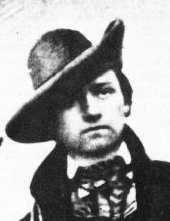Sometimes it’s better to let your curiosity rest for a little while, especially when a violent despot takes charge of the region you want to do geological studies on. That was the takeaway lesson for Adolf Schlagintweit (English Wikipedia page | German) when Wali Khan discharged the German explorer’s head in 1857 in the Kashgar region of present-day China.
 Schlagintweit and his brothers, Hermann and Robert, were in pursuit of knowledge, following up Hermann and Adolf’s drab and long-titled work Untersuchungen über die physikalische Geographie der Alpen, in ihren Beziehungen zu den phänomenon der Gletscher, zur Geologie, Meteorologie, und Pflanzengeographie (Studies of the Physical Geography of the Alps, in Relation to the Phenomena of Glaciers, Weather, and Phytogeography) and equally odorless (but far more accessibly titled) successor Neue Untersuchungen über die physikalische Geographie und Geologie der Alpen (New Studies of the Physical Geography and Geology of the Alps), authored by all three.
Schlagintweit and his brothers, Hermann and Robert, were in pursuit of knowledge, following up Hermann and Adolf’s drab and long-titled work Untersuchungen über die physikalische Geographie der Alpen, in ihren Beziehungen zu den phänomenon der Gletscher, zur Geologie, Meteorologie, und Pflanzengeographie (Studies of the Physical Geography of the Alps, in Relation to the Phenomena of Glaciers, Weather, and Phytogeography) and equally odorless (but far more accessibly titled) successor Neue Untersuchungen über die physikalische Geographie und Geologie der Alpen (New Studies of the Physical Geography and Geology of the Alps), authored by all three.
The Schlagintweits were successfully largely because of their ability to draw: their writing left much to be desired, and their scientific skills were frequently a target of ridicule after the voyage that saw the end of Adolf.
The East India Company funded that venture, which was intended to take magnetic field measurements, beginning in 1854. The trek was spurred on by the then-85-year-old Alexander von Humboldt, who had extensively traversed Latin America and attempted the first scientific description of its geology and wildlife; von Humboldt, a noted scientist throughout Europe, convinced the East India Company to pony up large amounts of money for what he expected to be a significant geological study, one that he long sought but could not undertake himself. This relationship is explored in-depth by Gabriel Finkelstein in his well-written History of Science article “‘Conquerors of the Künlün? The Schlagintweit Mission to High Asia, 1854–57”.
The brothers made their way to central India and from there journeyed north into the Himalayas. They did not travel together, but separated and re-united occasionally to go over samples, pictures, and notes.
After their last meeting in the fall of 1856, Adolf’s itinerary brought him through the mountains of Tibet and into present-day China, near the borders with Kyrgystan and Pakistan. It was in this Kashgar region that the geologist found himself embroiled in what would be the last in a series of revolts by the East Turkestan Khojas, a group claiming nobility in Eastern Kazakhstan from the time of Genghis Khan.*
Adolf’s end is largely shrouded in mystery, but some contemporaneous accounts given to the British government provide a minimal sketch. Schlagintweit’s ostensible goal was to reach the city of Kashgar; despite much of his party deserting, and in spite of a warning from fleeing refugees that the notably cruel Wali Khan had initiated a rebellion, Schlagintweit pressed on.
He was met at the city’s border and brought before the Khan, who, having little use for European interlopers wandering his territory, accused the scientist of being a spy and had Adolf summarily beheaded.
Adolf’s notebook was later purchased by a passing Persian from the tobacco shop, where its pages were being used to wrap tobacco leaves. The purchaser tracked down a skull he believed to be Schlagintweit’s and brought the chartaceous and skeletal evidence to India.
The book published from the travels of the Schlagintweits is available here. It has been widely panned as dull.
* Four years after Wali Khan was deposed once again by the Chinese, Uighurs successfully battled for the region’s brief independence. Tensions in the region, needless to say, have not settled.
On this day..
- 2020: Lezmond Mitchell
- 2012: Seventeen Afghan civilians
- Feast Day of St. Alexander of Bergamo
- 1810: Santiago de Liniers
- 1791: Whiting Sweeting, who slew the first U.S. cop to die in the line of duty
- 1864: William Howe, deserter
- 1806: Johann Philipp Palm, press martyr
- 1874: Private Joseph Michaud, the first in Manitoba
- 1825: Stephen Videto, Indian giver
- 1823: Natty and Louie, Demerara rebels
- 2008: Behnam Zare, pleading for his life
- 2004: Enzo Baldoni
